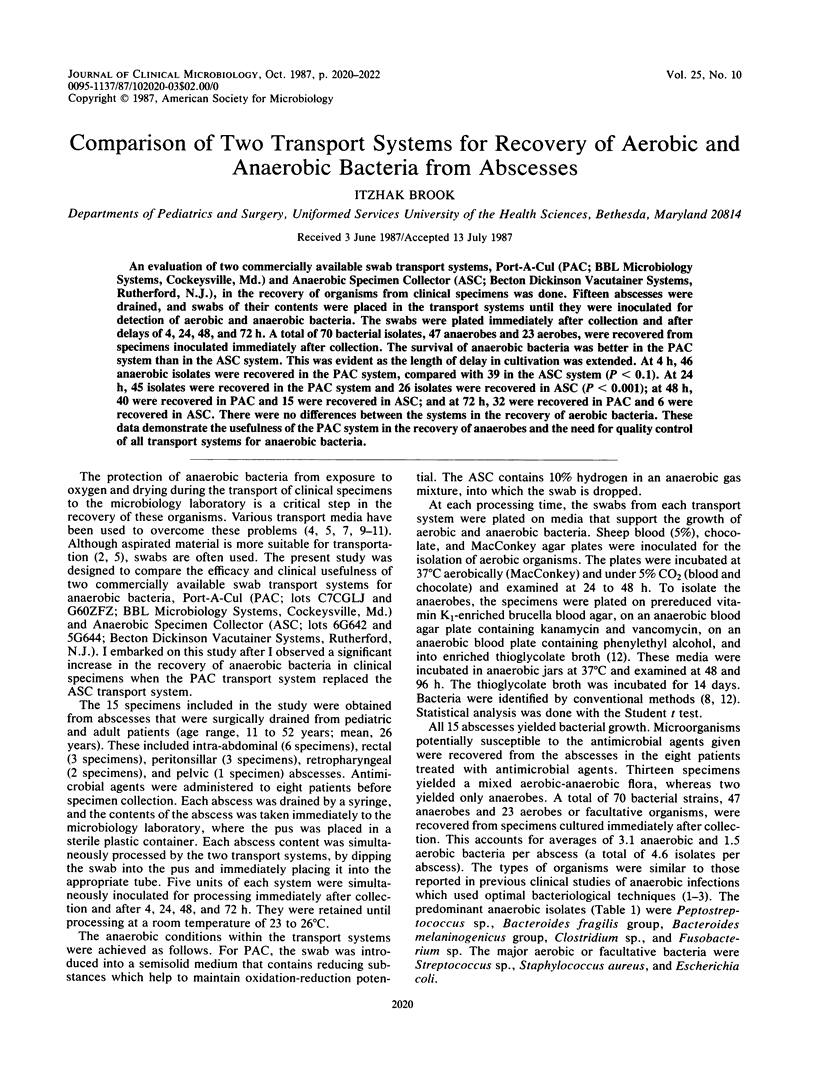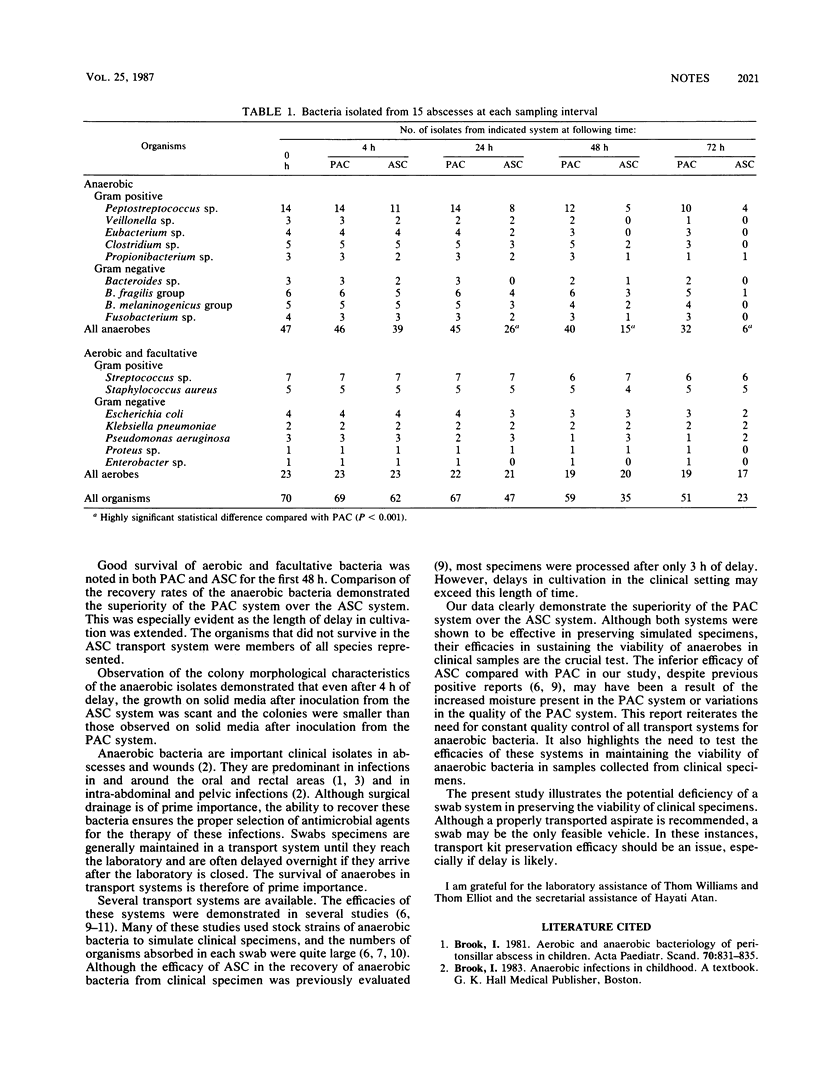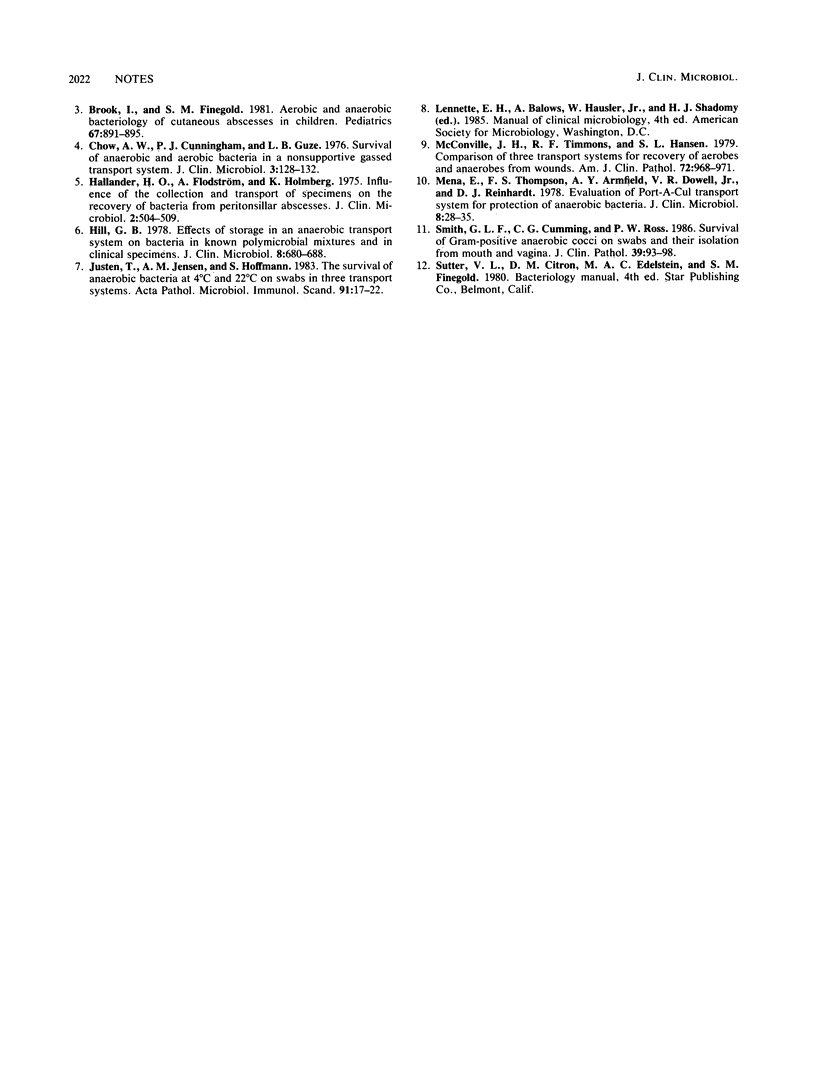Abstract
An evaluation of two commercially available swab transport systems, Port-A-Cul (PAC; BBL Microbiology Systems, Cockeysville, Md.) and Anaerobic Specimen Collector (ASC; Becton Dickinson Vacutainer Systems, Rutherford, N.J.), in the recovery of organisms from clinical specimens was done. Fifteen abscesses were drained, and swabs of their contents were placed in the transport systems until they were inoculated for detection of aerobic and anaerobic bacteria. The swabs were plated immediately after collection and after delays of 4, 24, 48, and 72 h. A total of 70 bacterial isolates, 47 anaerobes and 23 aerobes, were recovered from specimens inoculated immediately after collection. The survival of anaerobic bacteria was better in the PAC system than in the ASC system. This was evident as the length of delay in cultivation was extended. At 4 h, 46 anaerobic isolates were recovered in the PAC system, compared with 39 in the ASC system (P less than 0.1). At 24 h, 45 isolates were recovered in the PAC system and 26 isolates were recovered in ASC (P less than 0.001); at 48 h, 40 were recovered in PAC and 15 were recovered in ASC; and at 72 h, 32 were recovered in PAC and 6 were recovered in ASC. There were no differences between the systems in the recovery of aerobic bacteria. These data demonstrate the usefulness of the PAC system in the recovery of anaerobes and the need for quality control of all transport systems for anaerobic bacteria.
Full text
PDF


Selected References
These references are in PubMed. This may not be the complete list of references from this article.
- Brook I. Aerobic and anaerobic bacteriology of peritonsillar abscess in children. Acta Paediatr Scand. 1981 Nov;70(6):831–835. doi: 10.1111/j.1651-2227.1981.tb06235.x. [DOI] [PubMed] [Google Scholar]
- Brook I., Finegold S. M. Aerobic and anaerobic bacteriology of cutaneous abscesses in children. Pediatrics. 1981 Jun;67(6):891–895. [PubMed] [Google Scholar]
- Chow A. W., Cunningham P. J., Guze L. B. Survival of anaerobic and aerobic bacteria in a nonsupportive gassed transport system. J Clin Microbiol. 1976 Feb;3(2):128–132. doi: 10.1128/jcm.3.2.128-132.1976. [DOI] [PMC free article] [PubMed] [Google Scholar]
- Hallander H. O., Flodström A., Holmberg K. Influence of the collection and transport of specimens on the recovery of bacteria from peritonsillar abscesses. J Clin Microbiol. 1975 Dec;2(6):504–509. doi: 10.1128/jcm.2.6.504-509.1975. [DOI] [PMC free article] [PubMed] [Google Scholar]
- Hill G. B. Effects of storage in an anaerobic transport system on bacteria in known polymicrobial mixtures and in clinical specimens. J Clin Microbiol. 1978 Dec;8(6):680–688. doi: 10.1128/jcm.8.6.680-688.1978. [DOI] [PMC free article] [PubMed] [Google Scholar]
- Justesen T., Jensen A. M., Hoffmann S. The survival of anaerobic bacteria at 4 degrees C and 22 degrees C on swabs in three transport systems. Statistical evaluation by application of a variance component model. Acta Pathol Microbiol Immunol Scand B. 1983 Feb;91(1):17–22. doi: 10.1111/j.1699-0463.1983.tb00003.x. [DOI] [PubMed] [Google Scholar]
- McConville J. H., Timmons R. F., Hansen S. L. Comparison of three transport systems for recovery of aerobes and anaerobes from wounds. Am J Clin Pathol. 1979 Dec;72(6):968–971. doi: 10.1093/ajcp/72.6.968. [DOI] [PubMed] [Google Scholar]
- Mena E., Thompson F. S., Armfield A. Y., Dowell V. R., Jr, Reinhardt D. J. Evaluation of Port-A-Cul transport system for protection of anaerobic bacteria. J Clin Microbiol. 1978 Jul;8(1):28–35. doi: 10.1128/jcm.8.1.28-35.1978. [DOI] [PMC free article] [PubMed] [Google Scholar]
- Smith G. L., Cumming C. G., Ross P. W. Survival of gram positive anaerobic cocci on swabs and their isolation from the mouth and vagina. J Clin Pathol. 1986 Jan;39(1):93–98. doi: 10.1136/jcp.39.1.93. [DOI] [PMC free article] [PubMed] [Google Scholar]



